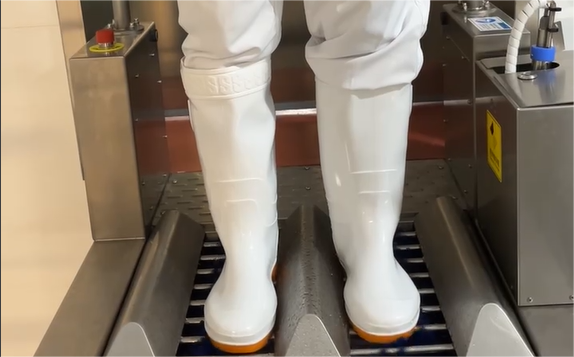Control of Chemicals in Food Workshops: Ensuring Safety and Hygiene
In any food workshop, maintaining a clean and hygienic environment is of utmost importance to prevent contamination and ensure consumer safety. One crucial aspect of this is the proper control of chemicals used in the food production process. From detergents and sanitizers to industrial boot cleaners and hand wash stations, every step of chemical usage should be meticulously monitored and regulated to minimize risks. This article will delve into the significance of industrial boot cleaners and hand wash stations in maintaining a safe and sanitized food workshop, while emphasizing the control of chemicals to ensure food safety.
Chemicals used in industrial boot cleaners
Industrial boot cleaners are essential equipment used in food workshops. Footwear can easily pick up contaminants, including dirt, bacteria, and chemicals from the production area. Without a proper boot cleaning system in place, these contaminants can be transferred to other areas, posing a significant risk to food safety. A robust industrial boot cleaner helps prevent cross-contamination by thoroughly cleaning and disinfecting boots before employees enter the production floor.
Chemicals used in industrial boot cleaners should be carefully selected and controlled to ensure their effectiveness and safety. The choice of cleaning agents must be compatible with the boots' material and capable of effectively removing contaminants. Moreover, these chemicals must also comply with relevant food safety regulations and guidelines to prevent any potential hazards. By implementing strict controls over the chemicals used in boot cleaners, food workshops can minimize the risks associated with improper chemical usage and maintain a hygienic environment.
.png) chemicals used in hand wash stations
chemicals used in hand wash stations
Similarly, hand wash stations play a critical role in food workshop hygiene. Handwashing is crucial to preventing the spread of pathogens and ensuring the hands of food handlers are clean before they come into contact with food. Industrial hand wash stations equipped with appropriate sinks, soap dispensers, and drying facilities are key components in maintaining proper hand hygiene.
The choice and control of chemicals used in hand wash stations are crucial to ensure effective hand sanitation without causing harm to employees or contaminating the food production area. The soap or handwash used should have bactericidal and virucidal properties to effectively kill pathogens. Additionally, these chemicals should be non-toxic, non-irritating, and comply with food safety standards. Regular monitoring and replenishment of these chemicals are essential to ensure their continuous effectiveness in hand hygiene practices.
The control of chemicals in food workshops
The control of chemicals in food workshops goes beyond industrial boot cleaners and hand wash stations. It extends to all aspects of chemical usage, including cleaning agents, disinfectants, and sanitizers employed during the production process. These chemicals play a crucial role in ensuring a safe and clean environment, but their improper use can pose serious risks to food safety.
To effectively control chemicals, food workshops should implement rigorous protocols and guidelines. This includes training employees on proper chemical handling, storage, and usage. Employees should be educated about the potential hazards of different chemicals and how to mitigate risks. Clear labeling of chemicals, along with Material Safety Data Sheets (MSDS), aids in proper identification and safe handling. Regular inspections and audits should be conducted to ensure compliance with safety regulations.
 Furthermore, food workshops should establish standard operating procedures (SOPs) for chemical use. SOPs should include guidelines on dilution ratios, contact time, and usage instructions. Regular calibration and maintenance of equipment used for chemical mixing and application, such as sprayers or dispensers, are necessary to ensure accurate measurements and proper chemical distribution. By adhering to these protocols, food workshops can effectively control chemicals and safeguard the integrity of their products.
Furthermore, food workshops should establish standard operating procedures (SOPs) for chemical use. SOPs should include guidelines on dilution ratios, contact time, and usage instructions. Regular calibration and maintenance of equipment used for chemical mixing and application, such as sprayers or dispensers, are necessary to ensure accurate measurements and proper chemical distribution. By adhering to these protocols, food workshops can effectively control chemicals and safeguard the integrity of their products.
Additionally, periodic risk assessments should be conducted to identify potential chemical hazards and implement adequate control measures. This includes evaluating the impact of chemicals on food safety during production, storage, and transportation. Risk assessments help identify critical control points where chemicals may come into contact with food, allowing for targeted preventive measures.
Effective communication with suppliers is another key aspect of chemical control in food workshops. Suppliers should be scrutinized to ensure they provide quality chemicals that comply with food safety standards. Working closely with suppliers can help address any concerns regarding chemical composition, potential allergens, and product quality.
Lastly, regular monitoring and testing of surfaces, equipment, and food products help verify that the control measures in place are effective. Microbiological swabbing can detect the presence of any harmful pathogens or contaminants. Additionally, testing the concentration and efficacy of cleaning and sanitizing chemicals can help maintain their effectiveness.
conclusion
Inconclusion, control of chemicals in food workshops is crucial for maintaining a safe and hygienic environment. Industrial boot cleaners and hand wash stations are essential components of this control, as they aid in preventing cross-contamination and ensuring hand hygiene. Proper selection, usage, and control of chemicals used in these equipment and throughout the food production process are essential to prevent risks associated with their misuse. By adhering to strict protocols, conducting risk assessments, and maintaining effective communication with suppliers, food workshops can take significant steps towards ensuring the safety and hygiene of their products.



